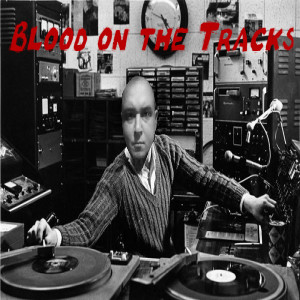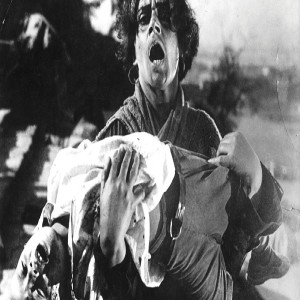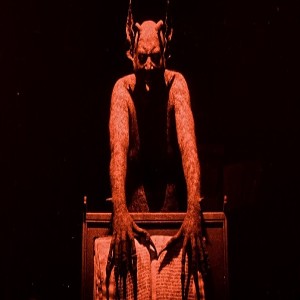They Must Be Destroyed On Sight!
2020-02
Episodes

Friday Feb 28, 2020
Blood on the Tracks Episode 32: Lovecraft Adaptations.
Friday Feb 28, 2020
Friday Feb 28, 2020
Cinematic adaptations of H. P. Lovecraft's work have been pretty hit-or-miss over the years, but even a lot of bad adaptations have had some fine music attached to them. This month Lee digs through about 40 years of the notable examples. Get your ear buds in, your elder signs ready, and don't bloody well read from the Necronomicon, if you know what's good for you.
--Opening Titles & Main Theme from "The Haunted Palace" (1963) --Ronald Stein --Main Title from "Die, Monster, Die!" (1965) --Don Banks --Dunwich; Cult Party; & Strange Sleep from "The Dunwich Horror" (1970) --Les Baxter --Re-Animator Theme from "Re-Animator" (1985) --Richard Band --They All See from "From Beyond" (1986) --Richard Band --Main Title from "The Curse" (1987) --Franco Micalizzi --Main Title & Abomination from "The Resurrected" (1991) --Richad Band --Main Theme from "The Lurking Fear" (1994) --Jim Manzie --Ezequiel's Story from "Dagon" (2001) --Carles Cases --Starry, Starry Night from "The Call of Cthulhu" (2005) --Troy Sterling Nies --Main Title from "Dreams in the Witch-House" (2005) --Richard Band
Opening and closing music: End Title from "Horror Express" by John Cacavas & In Un Altro Bar from "Revolver" by Ennio Morricone.

Monday Feb 17, 2020
TMBDOS! Episode 195: "Battleship Potemkin" (1925).
Monday Feb 17, 2020
Monday Feb 17, 2020
Lee and Daniel are joined by their friend and fellow podcaster Jack Graham to talk about "Battleship Potemkin" (1925); the Sergei Eisenstein-directed, state-funded Russian propaganda film about a real-life mutiny aboard the titular Russian warship in 1905. Having Jack on, who knows a thing or two about communism, socialism, and Russian history, the hosts dig deep into some of the history behind the film and the real life event, and what the film gets correct (it's actually a hell of a lot). There's talk about what propaganda was then compared to what we consider it to be now; the techniques Eisenstein used in his films, including his famous uses of the montage; comparing this film to other "classic" propaganda films; and why a lot of the negative criticisms of this film are coming from a place of ignorance. Oh yeah...if you hadn't guessed, there might be some political conversation, too, so you've been warned. Listener comments and what the hosts have watched lately are also covered.
"Battleship Potemkin" IMDB
Featured Music: "The Big Ship" by Brian Eno & "Rock the Boat" by The Hues Corporation.

Monday Feb 10, 2020
TMBDOS! Episode 194: "The Covered Wagon" (1923) & "The Iron Horse" (1924).
Monday Feb 10, 2020
Monday Feb 10, 2020
Lee and Daniel cover some big-time early silent westerns this time out, both focused on events that helped build America and the mythology that arose around it. These two films - the top earners at the box office for their respective years - re-energised and also influenced the entire western genre to come afterwards. This time it's "The Covered Wagon" (1923) & "The Iron Horse" (1924). Topics include white-washed imperialism; whites playing Chinese and Chinese playing Native Americans; Cowboy Judd Hirsch; eye-gouging (or a lack thereof); the real life Jim Bridger, and our fictional take we want to sell to the Coen brothers; and how we've decided to just end TMBDOS! and start a podcast about the tv sitcom "Wings" (not really though, so don't worry). Things in our Facebook group and what Daniel has watched recently are also covered.
"The Covered Wagon" IMDB
"The Iron Horse" IMDB
Featured Music: "Wagon Train" by Carter Burwell; "Mile Long Train" by Jimmy Dean; "Railroad Blues" by Woodie Guthrie; and "Midnight Special" by Lead Belly.

Monday Feb 03, 2020
TMBDOS! Episode 193: "The Cabinet of Dr. Caligari" (1920) & "Häxan" (1922).
Monday Feb 03, 2020
Monday Feb 03, 2020
Lee and Daniel are back again to cover some more silent film. This time out they look at two films that are considered all-time classics. First up they get sleepy and stabby with what is possibly the most famous example of German expressionism on film, "The Cabinet of Dr. Caligari" (1920). Then they line up to kiss the Devil's ring of fire in the docu-drama "Häxan" (1922). Mental illness on film; devil sex parties; impressive early special effects; and how Werner Herzog might have remade "Caligari" are just a few of the things brought up. A follow-up from last week about the host's thoughts on "Joker", and listener comments, are also covered.
"The Cabinet of Dr. Caligari" IMDB
"Häxan" IMDB
Featured Music: "Calliope" & "Dave the Butcher" by Tom Waits; "The Witch" by The Rattles; and "The Witch" by The Sonics.

Friday Jan 31, 2020
Blood on the Tracks Episode 31: Bastard Alien(s) Part 2.
Friday Jan 31, 2020
Friday Jan 31, 2020
Lee returns for a second look at music from films inspired by "Alien" and "Aliens". While there are a billion of these rip-off films, Lee quickly discovered when attempting to source the music, most of these films just don't have available soundtracks/scores, and even the ones that do usually only come from sources of dubious quality. That equals a bit less music than usual, and more talking from Lee. We know you're thrilled!
--Suite from "The Killings at Outpost Zeta" (1980) --Robert Emenegger --Afternoon of a Spawn & The Spawn Who Came in from the Cold from "The Deadly Spawn" (1983) --Michael Perilstein --After Autopsy & Hypnosis from "Lifeforce" (1985) --Michael Kamen --Introduction & Cruel System from "Lily C.A.T." (1987) --Akira Inoue --Baby, You've Changed from "Metamorphosis: The Alien Factor" (1990) --John Gray & Peter M. Stoller --End Theme from "Critters 4" (1992) --Peter Manning Robinson --Underwater Grave/The Saipan from "Deep Rising" (1998) --Jerry Goldsmith --The Gauntlet from "Pitch Black" (2000) --Graeme Revell --Doom from "Doom" (2005) --Clint Mansell
Opening and closing music: End Title from "Horror Express" by John Cacavas & In Un Altro Bar from "Revolver" by Ennio Morricone.